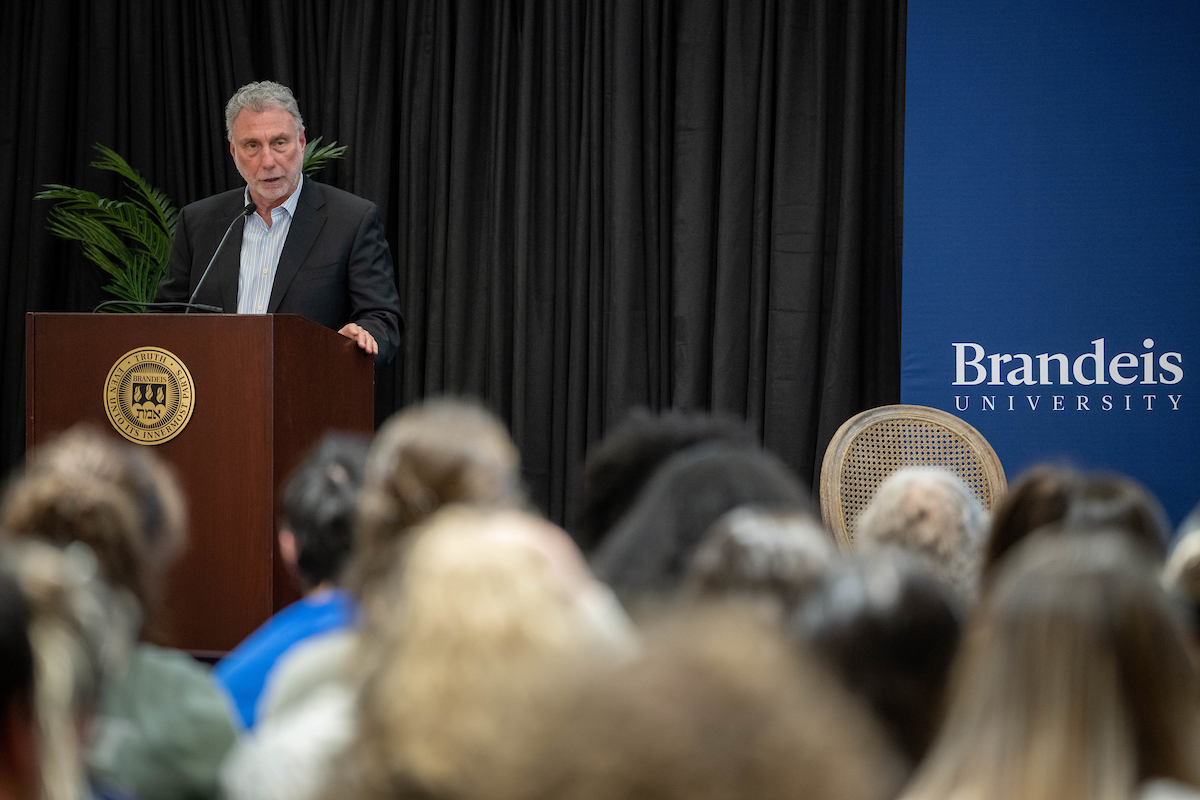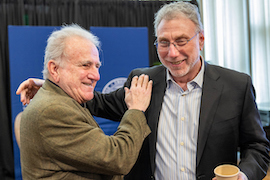Defending objectivity in journalism: Martin Baron honored with Richman Fellowship
 Photo/Gaelen Morse
Photo/Gaelen MorseMartin Baron speaks to the crowd in Rapaporte Treasure Hall.
Celebrated newspaper editor Martin Baron defended the long-standing journalism standard of objectivity against growing criticism during his Richman Fellowship presentation March 16.
"Objectivity has to stay. Our profession will suffer horribly in public trust if it does not," Baron said. "We will find ourselves contributing to political tribalism instead of helping to conquer it. As we aspire to be seen as arbiters of fact, we will be seen as activists and partisans. Our influence and our impact will erode."
Baron led the Washington Post's newsroom as its executive editor from 2013 until his retirement last year. The Post won 11 Pulitzer Prizes during his tenure. He was previously editor of the Boston Globe, where he oversaw the newspaper's investigation of the Catholic Church’s concealment of clergy sex abuse, which was awarded a Pulitzer Prize in 2003 and later portrayed in the 2015 Academy Award-winning film "Spotlight."
Before being formally recognized as this year's Richman Fellow by Provost Carol Fierke, Baron was introduced to the audience in Rapaporte Treasure Hall by Professor of the Practice of Journalism Neil Swidey, who worked for Baron as a reporter and editor during his time at the Boston Globe.
"When Marty tackles an important issue, he's all business, but he's also supportive and kind and very funny," Swidey said. "Yet his genius is that even in those lighter moments, he manages to keep his eyes on the prize. Marty is always pushing everyone around him to do better."
The Richman Fellowship recognizes individuals active in public life whose contributions have had a significant impact on improving American society, strengthening democratic institutions, advancing social justice, or increasing opportunities for all citizens. The annual award includes a $25,000 prize.
The residency brought Baron to campus for three days to engage with the Brandeis community, including visiting classes and a screening and discussion of "Spotlight."
In his Richman presentation on March 16, Baron said journalists, particularly a rising generation, are increasingly repudiating the standard of objectivity because they view it as a root cause of many of the industry’s failures.
The history of objectivity as a tenet of journalism dates back about 100 years, when journalist Walter Lippmann championed it as a way to combat propaganda and other bias that favored establishment powers.
Lippmann’s definition of objectivity is the one Baron believes still holds true: A commitment to as impartial an investigation of the facts as is humanly possible. To determine the facts and place them in context. To have journalism be as scientific as possible.
Objectivity also requires journalists to be generous listeners and eager learners, who are conscious of their own prejudices and preexisting opinions, Baron said.

Baron is greeted by former Boston Globe colleague Stephen Kurkjian.
"The true meaning of objectivity is not the straw man that is routinely erected by critics so that they can then tear it down. Objectivity is not neutrality. It is not, on the one hand, on the other hand journalism. It is not false balance or both sidesism," he said. "It is not giving equal weight to opposing arguments when the evidence points overwhelmingly in one direction. It does not suggest that we as journalists should engage in meticulous thorough research only to surrender to cowardice by failing to report the facts we've worked so hard to discover."
He acknowledged that journalism has failed in many ways, but argued that solving these problems required committing more deeply to objectivity, not dismissing it.
"We have often failed, embarrassingly and egregiously. We often did harm through errors of commission and errors of omission, because of haste and neglect, because of prejudice and arrogance. But our failures were not ones of principle. They were failures to live up to principle,” he said. “We can have and we should have a vigorous debate about how democracy and the press can serve the public better. But the answer to our failures as a society and as a profession is not to renounce principles and standards. There is far too much of that taking place in today's America. The answer is to restate our principles, reinforce them, recommit to them, and do a better job of fulfilling them."
The Richman fellowship was created by Dr. Carol Richman Saivetz '69, along with her children, Michael Saivetz '97 and Aliza Saivetz Glasser '01, in honor of her parents, Fred and Rita Richman. Recent winners include disability rights activist Rebecca Cokley; playwright, actor, and educator Anna Deavere Smith; and human rights attorney Vanita Gupta.
The Richman Fellowship is hosted by the International Center for Ethics, Justice and Public Life on behalf of the Office of the President of Brandeis University.
Categories: Alumni, Humanities and Social Sciences





